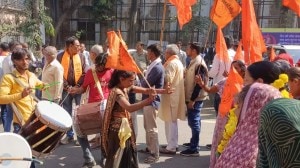In times of a pandemic, the elderly in Ahmedabad villages step up
The two elderly men, who are part of a 'Gram Yoddha (Village Warrior)’ committee, were entrusted with the task of ensuring compliance of the lockdown in their village three days ago.
 As part of the initiative, they have blocked the main entrance of their village with twigs, bamboo shoots and steel wires. A notice barring the entry of any ‘outsider’ in the village has also been put up. (Representational Image)
As part of the initiative, they have blocked the main entrance of their village with twigs, bamboo shoots and steel wires. A notice barring the entry of any ‘outsider’ in the village has also been put up. (Representational Image)
The clock strikes four in the evening and two elderly men — donning white turbans and holding wooden sticks — arrive at the entrance of Tragad village on the outskirts of Ahmedabad. They keep a watchful eye on the minimal traffic on the road amid the nationwide lockdown in an attempt to contain the spread of coronavirus.
The two elderly men, who are part of a ‘Gram Yoddha (Village Warrior)’ committee, were entrusted with the task of ensuring compliance of the lockdown in their village three days ago. As part of the initiative, they have blocked the main entrance of their village with twigs, bamboo shoots and steel wires. A notice barring the entry of any ‘outsider’ in the village has also been put up.
However, as COVID-19 cases steadily rise in the city and hints of a lockdown extension are being dropped by various state governments, it is becoming increasingly difficult for the ‘yoddhas’ to implement the lockdown. Since Tragad — a village with a population over 5,000 people — is managed by the Ahmedabad Municipal Corporation (AMC), there is no sarpanch in this village, thereby making the initiative a voluntary effort on behalf of the villagers.
“We only allow dairy owners to herd their cattle outside the village in the morning and evening as they belong to essential services. All other residents have been prohibited from leaving the village unless it’s extremely urgent. Young boys and men, who have a habit of venturing out in the evening, have stopped after we issued warnings to them. Now, they are not even allowed to assemble outside their houses…but we are not sure if they will listen to us till the end of April. The government has to introduce some clarity on the lockdown period,” said Jagabhai Thakore (68), a senior citizen of Tragad village.
Like Tragad, there are a total of 464 villages in Ahmedabad’s rural area that are now imposing voluntary lockdown and assisting the police and administration officials in the combined fight against the pandemic. While the walled city of Ahmedabad is being sealed and managed by the police and municipality officials, and high rise societies have their security guards to fall back on, the responsibility of imposing the lockdown in villages is being entrusted to Gram Yoddha committees.
According to Ahmedabad District Development Officer Arun Mahesh Babu, the initiative was introduced after the city area saw rising clusters of COVID-19 patients.
“In each of the 464 villages, the Gram Yoddha committee consists of a sarpanch, talati, two senior citizens and a teacher, who are supposed to keep a record of who is entering and exiting the village and prohibit the entry of street hawkers. If it’s extremely urgent, villagers may be exempted only after the permission of the committee. The committee will also ensure that there is no dearth of essentials in the village. An appeal has also been made to self-sufficient people to help out the needy in their respective villages in these times of crisis,” Babu had said in an official statement.
In Zanu village of Daskroi taluka, the Gram Yoddha committee has charted out a schedule for villagers to step out of their houses for buying essentials.
“We only allow residents to shop from 8 am to 11 am and the dairy owners are allowed to operate two hours each in mornings and evenings. We are a population of 6,000 people and we have not allowed anyone to leave the village for the past one week,” said Baldevbhai Thakore, sarpanch of Zanu village.
Similarly, the residents in Chharodi village have imposed a voluntary lockdown, where the elderly are seen reprimanding youths if they are seen venturing out without any valid purpose.
Superintendent of Police, Ahmedabad (rural), RV Asari said that the initiative was introduced by the police and administration officials after realizing that villagers have a far better understanding of the threat that the pandemic poses than “educated city residents”.
“We also have 247 women who volunteered to assist the police in implementation of the lockdown at the village level. We have created multiple WhatsApp groups of sarpanches and volunteers to keep track of village activities. Whenever there is a problem, a police van immediately reaches the spot and the issue is sorted. However, that is only a rarity because villagers have a far better understanding of the crisis,” said Asari.







